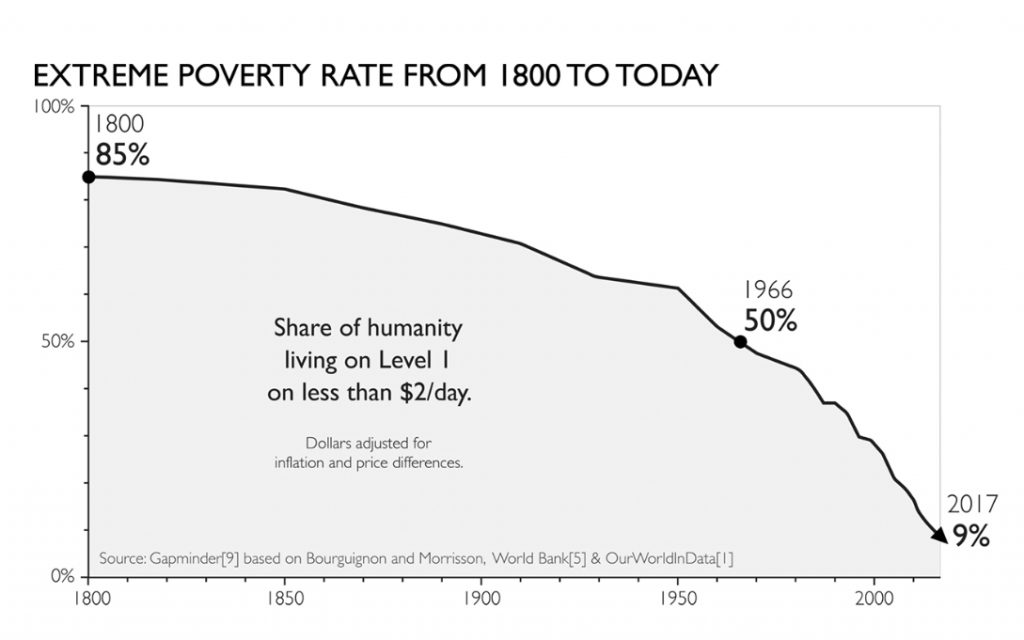
In addition to View from the Front Porch, I am introducing a new weekly feature entitled Misconceptions. An idea which comes from reading Factuals: Ten Reasons We’re Wrong About the World–and Why Things Are Better Than You Think by Hans Rosling. Learning that things are better in this world than we think they are is a much needed but generally resisted message because of deeply held misconceptions. Using reliable data, Rosling addresses and refutes ten major misconceptions that shape our view of the world in negative ways. Each week, I will include a misconception and a reality that refutes it.
Shifting Christian apologetics to newer questions:
…the future of Christian apologetics must look beyond answering the questions of modernity, such as the existence of God, the historicity of Jesus, and the veracity of Scripture. These questions are the product of the Enlightenment era when the primary concerns raised against the Christian faith were related to rationalism and scientific empiricism. While these types of questions should retain a proper place in the practice of contemporary apologetics, it is important to recognize that postmodernity asks new questions. These questions include, but are not limited to:
* How do Christians account for the colonization of the Western world, the genocide of Indigenous peoples, and the enslavement of Black people, all in the name of the Christian faith?
* Is Christianity the white man’s religion?
* How should Christian leaders respond to the sex scandals, racism, and abuses of power that have left a generation of believers disenchanted with the institutional Church?
* How should Christians respond to the cries for justice among marginalized communities, rather than merely dismissing them as liberal?
* How can Christians preach a message of unity and reconciliation when the Church itself is so divided?
These are the types of questions being asked by the postmodern skeptics of our time, Christian and non-Christian alike. These questions should not be interpreted as a threat to the Christian faith, but an opportunity. They are an opportunity for the institutional Church to look more like the bride of Christ, and for the God of justice to speak into the injustices of our world today. They are an invitation to engage in an apologetic that is more concerned with “gentleness and respect” than merely “giving an answer.” They are an indication that Christian apologetics must shift its approach from having all the answers, to being present in the questions. To quote a conversation I had with Dr. Dale Coulter, “what we need are not ‘apologetic experts’ given how much expertise is being questioned, but ‘family doctors’ who live with the people and show their concern through their concrete practices.” This just may be the best defense for the Christian faith in our postmodern age.
Scot McKnight
God in a box
Our trouble is not in knowing God, but, in that He has made Himself known, how do we live with what He has said? The reality and presence of Christ are not abstract or hard to know and find. They are present, even obvious. And that is where our discomfort begins.
And with the discomfort, others will beg us not to “put God in a box.” We prefer to have Him elsewhere, imaginary, pliable, and congenial. But He loves us too much to stay out of the Box. God is in the Box. Listen to Him.
Fr Stephen Freeman
https://blogs.ancientfaith.com/glory2godforallthings/2022/09/02/god-and-the-box-2/

Misconceptions
a wrong or inaccurate idea or conception
What do you need to hunt, capture, and replace misconceptions? Data.
Poverty in the world.
What is your perception?
In the last 20 years, the proportion of the world population living in extreme poverty has …
A: almost doubled
B: remained more or less the same ?
C: almost halved

Over the past twenty years, the proportion of the global population living in extreme poverty has halved.
Often opinions are nothing more than unsubstantiated feelings, illusions that things we knew are things we only felt.
To point out the flaws and deconstruct the edifice is easy work. To build something better, something true, something whole, is hard work, indeed, and it has received almost no attention. Building a civilization is among the hardest tasks that human beings ever undertake. Destoying them can be the work of an evening.
Fr Stephen Freeman
Scientific & Poetic Knowledge
…the difference between scientific knowledge and poetic knowledge. There are many ways to frame this distinction. “Scientific knowledge” describes knowledge that is “outside” of us: such as objective, verifiable, experimental results. “Poetic knowledge” (by far the harder to describe) refers to the knowledge we have from the “inside.” It is what we know because it is us, or because we have a participation in its life. Scientific knowledge gives us an ability to master and control the world around us. It also gives us a knowledge that is “alien” to us.
…poetic knowledge is acquired by union with and attachment to the object; scientific knowledge is acquired by distance and detachment from the object.
Living in a world of machines can be wonderfully abundant but lonely and isolating. Even when we study other humans, with scientific knowledge we place them in a category that we loathe: that of objects.
Richard Rohr (?)
a tourist or a pilgrim?
The tourist is impatient, jumping off the bus and taking pictures, getting a quick experience, hopping back on the bus, and then readying for the next stop.
The pilgrim wants time to see, hear, smell, and taste an experience.
I think of my students who come from a digitized world and think learning can be crammed, but it can’t. The patience of slow Bible reading, slow reading of important scholarship, and pondering over what has been read — these are what lead to theological formation. Cramming is for the tourist; pondering is for the pilgrim.
Is your life a tourist or a pilgrim?
Scot McKnight

View from the front porch
Ive been thinking a lot about reality, what is true and real. Here are a couple of quotes I came across recently:
It really is a war on reality. People who believe that reality is socially constructed come to believe that lying for the sake of building a socially just world is fine. And so, we find ourselves committing suicide as a civilization.
Rod Dreher
…our culture reminds us that we must never doubt ourselves, and if per chance there be any doubt, we should simply follow our tribe. These seem to be the first two principles of contemporary reflexive moral reasoning. They feel right, but are they?
Paul Nessleroade
I believe “war on reality” captures the essence of our cultural conflict.
An assumption that “Whatever your truth is is true for you.”, means they are not lying — it is true — it is their belief. as a result, “Invoking truth (reality) is rude and condescending.” Their belief is true, but it is not real, it is a mirage.“…an illusion of something that is real.
It should be no surprise conflict ensues.
STILL ON THE JOURNEY